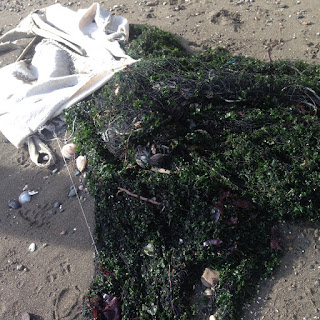Who let the dogs out?
f. You shall not use tidelands waterward from the line of mean higher high water (MHHW) for the storage of aquaculture gear (e.g., bags, racks, marker stakes, rebar, nets, tubes). All gear that is not immediately needed will be moved to a storage area landward ofMHHW. Note: This is not meant to apply to the wet storage of harvested shellfish.
Whose dog messed up this beach?
Loose nets, loose bags. Who cares?
This geoduck grower doesn't.
More bags loose in the tidelands.
Loose PVC pipes and bag.
Rebar.
Who cares? The people who found these loose on the tidelands do, not the grower who didn't feel it important enough to pick up the mess. Agencies are being taken for a ride by shellfish growers who profess to be "good stewards" of the tidelands and non-profits who gladly hold out their hands and accept donations. This industry's adverse impact on the tidelands doesn't stop and they want to expand, in the case of Taylor Shellfish, three-fold.
Money, jobs, who could ask for more?
Step down Shoreline Management Act. There's a new driver in town and it's not Washington state's taxpayers.
Who's driving the regulatory environment to protect Puget Sound's intertidal areas? The recent Shoreline Master Program handbook released by the Department of Ecology seems clear: it is no longer the state's Shoreline Management Act which controls development in Puget Sound's tidelands but NOAA's misguided policies to "Encourage and foster sustainable aquaculture development that provides domestic jobs,
products, and services and that is in harmony with healthy, productive, and resilient marine
ecosystems, compatible with other uses of the marine environment." The handbook goes on to say:
The SMA is one of the enforceable policies of Washington’s Coastal Zone Management Program, which is part of the federal program administered by NOAA. Shoreline Master Programs for jurisdictions along the Pacific coast and Puget Sound are part of the federal program. (p. 4, SMP Handbook)
Street sweepers and tulip bulb harvesters
were not a "preferred use" of Washington's
"most valuable and fragile natural resource."
Washington's SMA is no longer the primary controlling regulatory act protecting Puget Sound's intertidal area. The act, passed by the legislature and approved by an overwhelming majority of Washington's citizens, has been relegated to a second class position when it comes to aquaculture. While aquaculture was considered a "preferred use" when it was passed, it was not the industrial activity found today. It was never intended to be driven by NOAA policies and Washington DC politics.
$70,000 spent on lobbying - in 3 quarters.
If a little money to influence Washington DC is good then more is better. Plauche and Carr: A law firm or a lobbying firm?
There is little doubt this is no longer just a "fifth generation family" growing a few clams and oysters. This is an industry focused on profits and aware that lobbying will craft federal regulations to their benefit. Along the way, Washington's citizens have lost control of what happens to Puget Sound. In the first 3 quarters alone, $70,000 have has been given to the Glover Park lobbying firm ("Own the Conversation") in Washington DC. As seen in the Disclosure form, these funds are channeled through the shellfish industry's law firm, Plauche and Carr, and focused on influencing a number of agencies, including the Army Corps and NOAA. This is an industry with money and motivation to make more at the expense of Puget Sound's tidelands.
Get involved - the shellfish industry is.











No comments:
Post a Comment